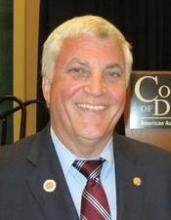For the most part, the Centers for Medicare and Medicaid Services followed the advice of the American Medical Association’s Specialty Society Relative Value Scale Update Committee when the agency decided how to update work values for Medicare’s physician fee schedule, according to a study published in the May issue of Health Affairs.
This reliance on the RUC’s recommendations didn’t penalize primary care physicians, because the CMS was more likely to decrease recommended work values for medical specialty, surgical, and radiologic services relative to evaluation and management services, the study’s authors said (Health Affairs 2012;31:965-72).
"However, it does not explain why there has been no reduction in the income gap between primary care providers and specialists," the authors wrote.
The authors, led by Miriam J. Laugesen, Ph.D., of the department of health policy and management at Columbia University in New York, analyzed the CMS’s decisions on updating work values for physician services between 1994 and 2010.
The analysis found that the CMS agreed with 2,419 (87.4%) of the RUC’s 2,768 work value recommendations. The CMS decreased 298 work values (10.8% of the total), and increased 51 work values (1.8% of the total).
The rate of agreement between the CMS and the RUC in 1994-2010 has fluctuated, and the investigators noted that "some of the largest year-to-year differences have occurred in more recent years, such as the high of 99% in 2006 and the low of 62.2% in 2007."
On average, the RUC recommended significantly higher work values than those ultimately accepted by the CMS, and the average work value for new services also was significantly higher in the committee’s recommendations than in the decisions ultimately made by the CMS, the study found.
Surgical services saw the widest gap between RUC recommendations and CMS decisions, whereas pathology and laboratory services saw the smallest gaps. The CMS decreased the committee’s recommended work values for radiology services by 2.7% and those for medical specialty services by 4.7%.
Based on the available data, the authors weren’t able to determine why the CMS agreed or disagreed with the recommendations made by the RUC, the authors said.
"One major question is whether primary care physicians are penalized in the process of updating physician work values," the study said. "It is not easy to answer that question, given that the Medicare fee schedule includes services provided by many different kinds of physicians."
Nevertheless, the authors noted that the CMS could strengthen the review and calculation process through "long-term investment in the agency’s ability to undertake research and analysis of issues such as how the effort and time associated with different physician services is determined, and which specialties – if any – receive higher payments than others as a result."
American Academy of Family Physicians president Glen Stream said in an interview that it wasn’t surprising that the study found a high level agreement between the RUC’s recommendations and the CMS’s ultimate decisions on physician work values. "I do think they [the study’s authors] got it right," Dr. Stream said. "I wouldn’t say this is new news, but it’s a more thorough analysis."
Regardless, the RUC process does advantage procedure-driven specialties over cognitive services provided by primary care physicians, Dr. Stream said, adding, "then those biases are more often than not simply accepted by CMS."
The AAFP supported federal legislation last year that would have required the CMS to compare data from independent contractors vs. those in the RUC recommendations, but the legislation went nowhere, Dr. Stream said. Currently, the academy isn’t advocating specifically for either the CMS or independent contractors to provide recommendations on work values, he said, "but we need more [than the RUC]. Particularly for primary care services, we need a different voice – an alternative methodology."
Dr. Laugesen is supported by a Robert Wood Johnson Foundation Investigator Award in Health Policy Research.


